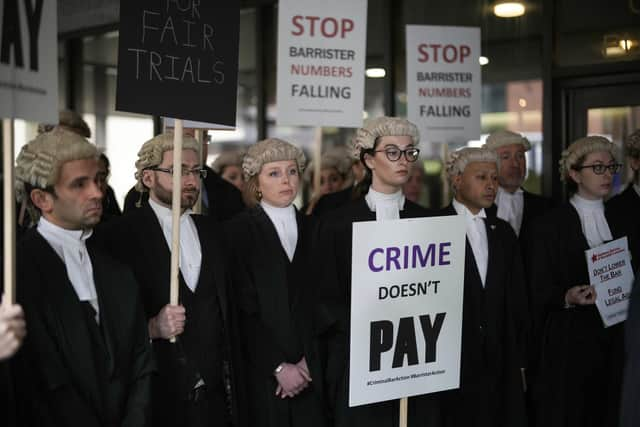The Government was long aware of legal aid issues before barristers decided to strike - Peter Collier
Although they were always keen to keep fees as low as possible, they did understand the need for the fee structure to ensure that new entrants to the profession were recruited and retained, as from them would come the future senior practitioners and judges.
I cannot remember a time when they were not prepared to come to the table and have serious and constructive conversations with us. On a number of occasions when things got sticky the Lord Chancellor himself came and sat down at the table with us.
Advertisement
Hide AdAdvertisement
Hide AdDuring my time as a Judge at Leeds I noticed there seemed to be an increasing concern about recruitment and retention in all parts of the criminal justice system arising from the substantial cuts being made to the financing of criminal justice services – police, CPS, courts service, prisons and probation - but nowhere more so than to the legal aid budget.


It was in my last year, 2018, that those cuts to the courts service in the capping of the number of sitting days led not only to an increased backlog of cases, but more importantly to the listing of future trials further and further ahead.
Although that backlog was increased by Covid, it was already wholly unacceptable in 2018/19.
It was encouraging for many of us that in 2019 the government set up an independent review of criminal legal aid chaired by Sir Christopher Bellamy QC. The research carried out by the reviewers was very extensive and the resulting report was detailed and its conclusions persuasive. The report was published in November 2021 with a substantial number of recommendations as to what was required across-the-board in order to ensure that that there will continue to be a viable criminal justice system.
Advertisement
Hide AdAdvertisement
Hide AdHe highlighted the problems being caused because a significant number of practitioners had left the practice of criminal law and turned to other areas of the law as a result of what they considered inadequate financial reward.
The central recommendation of the report (paragraph 1.38) was that the “funding for criminal legal aid should be increased for solicitors and barristers alike as soon as possible to an annual level, in steady state, of at least 15 per cent above present levels, which would in broad terms represent additional annual funding of some £135m per annum.” He went on to say that that sum “is in my view the minimum necessary as the first step in nursing the system of criminal legal aid back to health after years of neglect.”
In July 2022 the government said that they accepted his recommendations.
However the government has said that any increases will only apply to new cases from October this year. The backlog and trial listing delays means that in the majority of these new cases solicitors and barristers will not receive any uplift in payments until 2023 and in some cases 2024, as in almost all cases there are no payments prior to the case concluding. The cases currently being tried, and those currently awaiting trial, have been in the system for up to two years. Some work will have been done on them but the greatest work, preparing for trial and the trial itself, will be done from now onwards, and there will be no increase in the rates of pay for any work done between now and the case concluding. If last summer I had booked a builder to come and do some work next year, I would not be surprised to hear him tell me that he would now need to charge me more than if he had done the work a year ago.
Advertisement
Hide AdAdvertisement
Hide AdA few years ago when the fee structure for some pieces of work was reduced the government had no difficulty in applying the reduction immediately. There can be no real reason, apart from a small financial cost of rejigging computer software systems, why this increase should not be paid immediately.
I understand that it is the refusal of the government at any senior level to engage with the bar on these issues that has driven them to take the current action.
On Thursday the Daily Mail reported Dominic Raab as saying that because the bar was holding him to ransom he was considering extending Crown Court rights of audience to more solicitors and extending the Public Defender Service as a response.
Quite how he will attract to such poorly paid work more solicitors, when the number of them doing criminal work is also reducing, is unclear. And the Bellamy report said that a “major expansion of the PDS” was not likely “to improve on what we have in terms of cost quality and efficiency”.
Advertisement
Hide AdAdvertisement
Hide AdThis is not a “strike” in the traditional sense. It is a decision made by a number of self-employed piece-work practitioners to stop doing a certain type of work. I expect that quite a significant number will not stop working but will look to employ their advocacy skills in others of the law. That is the greater threat to the future of our criminal justice system. Without the current experienced criminal practitioners there will be no pool to recruit appropriately experienced judges to deal with criminal cases in the future.
Lord Christopher Bellamy is now an Under Secretary of State in the Ministry of Justice. I do not hear him saying on behalf of the government that when he spoke about the need for the payment of an additional £135m “as soon as possible”, he actually meant a payment that would be received in one to two years’ time.
Peter Collier QC was Recorder of Leeds between 2007 and 2018.